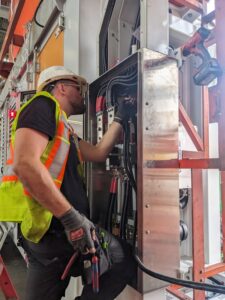August 8, 2024
Learn more about the exact electrical requirements of commercial buildings.
A commercial building’s electrical system is an essential component that ensures the smooth running of day-to-day activities. From powering lights and HVAC systems to supporting advanced technology and machinery, a commercial property’s electrical infrastructure must be robust, efficient, and compliant with regulations. Commercial Electricians at CMI Lighting It will help you create a safe and efficient environment by helping you understand and meet the following electrical requirements for commercial buildings.
Power load calculation
Accurate electrical load calculations are one of the most important aspects of designing a commercial building’s electrical system. This involves determining the total electrical demand required to support all of the building’s appliances, equipment, and systems. Electrical load calculations must take into account peak times, equipment used, and any future expansions or upgrades. Accurate load calculations ensure that the electrical system is not underpowered or overloaded, which can prevent outages, inefficiencies, and potential safety risks.
Compliance with electrical codes and standards
Commercial buildings are subject to strict electrical codes and standards designed to protect occupants and property. These codes vary by location but typically cover wiring, grounding, panel installations, and emergency systems. Compliance with local, state, and national codes, such as the National Electrical Code (NEC), is a legal requirement and essential to ensuring safety.
Energy Efficiency and Sustainability
Energy efficiency is a key consideration for commercial buildings. Efficient electrical systems reduce energy consumption, lower utility bills, and reduce a building’s carbon footprint. Installing energy-efficient lighting, HVAC systems, and controls such as timers and sensors can significantly improve a building’s energy performance. Additionally, businesses may benefit from incentives and rebates offered for energy-efficient upgrades.
Backup power systems
Backup generators, uninterruptible power supplies (UPS), and other emergency power systems ensure that operations continue during power outages. When designing or upgrading your electrical system, consider installing a backup power system that can be powered when the primary power source fails.
Lighting requirements
Lighting is an important aspect of a commercial building’s electrical system, affecting both functionality and aesthetics. Commercial lighting requirements must meet the needs of different spaces within a building, such as offices, lobbies, warehouses, and outdoor areas. Proper lighting design involves selecting the right fixtures, ensuring adequate lighting levels, and considering energy efficiency. LED lighting is becoming the preferred choice. For commercial buildings due to their long life, energy efficiency and high lighting quality.
Wire and cable infrastructure
The wiring and cabling infrastructure in a commercial building must be designed to support the building’s current and future needs. Proper installation, marking and organization of wires Wires and cables are essential for maintenance and troubleshooting. In older buildings, it is often necessary to update old wiring to meet modern safety standards and support advanced technology.
Safety and emergency systems
Safety is essential in any commercial building, and the electrical system is essential to maintaining it. Emergency lighting, fire alarms, security systems, and other safety-related electrical components must be integrated into the overall electrical design of the building. These systems require dedicated circuits and backup power to operate reliably during emergencies.
At CMI Lighting, we offer comprehensive electrical services for commercial buildings. Contact us today to learn more about how we can help ensure your commercial building’s electrical system is compliant and future-ready.
Learn about the commercial electrical services provided by CMI LIGHTING.
With over 35 years in the industry, CMI has the equipment to handle the logistics of any interior job. We also offer recurring solutions for property managers and upcoming developments. CMI Companies serves the Mid-Atlantic region and proudly serves clients in Northern Virginia, Maryland, Richmond, Southern Virginia, Manassas, Prince William County, Fairfax County, Rockville, and Prince George’s County. You can also check us out at Facebook, twitterand LinkedIn.
This entry was posted on Thursday, August 8, 2024 at 3:59 pm. Comments and notifications are currently closed.




